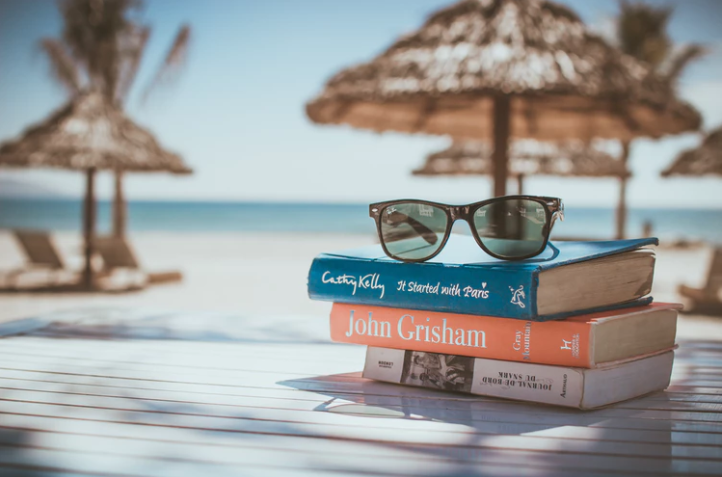
In July I hit pause on a busy year, spending time in the Orkney Islands and the Cairngorms, where I buried myself in a pile of books and emerged feeling restored and recharged.
I like to set new resolutions after a holiday and one of them was to finish a book every fortnight. Here’s what I’m reading at the moment.
Novacene: The Coming Age of Hyperintelligence by James Lovelock
The scientist and futurist argues that humans’ dominance of earth is coming to an end and that new beings will develop from existing artificial intelligence systems. They’ll think 10,000 times faster than we do and see us as plants. This sounds like the start of a sci fi film but relax, these beings will want to coexist with rather than take us over, as they’ll need us to make the planet habitable. I’m not sure if I share Lovelock’s optimism but I’m intrigued and looking forward to digging into his ideas further.
How to Be a Productivity Ninja by Graham Allcott
This was an excellent recommendation from Richard Piper, CEO of Alcohol Change UK , about how to make the most of the precious time that we all have. How can we get more done when we are already juggling busy jobs, families and extracurricular activities?
There are lots of good tips in this book, from how to manage email to how to organise and review your ever growing to do list. I found the chapter on attention management particularly useful. For example, proactive attention is when we are all at our most fully focused, alert and able to tackle tough challenges, but we are only in this state for 2-3 hours a day. After I read this I tracked how my attention fluctuates over 24 hours and I now plan my work schedule around this and achieve more as a result.
Rest by Alex Soojung-Kim Pang
Ever since Jeff Bezos of Amazon said that he needs a strict 8 hours sleep a night to be productive, think clearly and make good decisions I’ve been pondering how to be better rested. Pang is a Silicon Valley consultant who believes that we need a cultural shift in our lives towards taking more breaks, arguing that by working less we will achieve more and be happier.
I confess that before I read this book I always thought of recharging as something that needed to be sacrificed to be successful. Now I understand that rest is not an ‘either or’ it’s the ‘and’ which powers what we do. Pang looks at the habits of high achievers and advocates the virtue of walks, regular exercise and working for no more than 5 hours a day. (Apparently that’s what Charles Dickens did, although I bet he was never distracted by cat videos). Rest is full of nuggets of common sense about how we can all improve our mental health and become more fulfilled.
The Imposter Cure by Dr Jessamy Hibberd
Mandy Johnson’s honest and thoughtful blog about imposter syndrome last year inspired me to think more about how this mindset affects us. I’ve worked with many charity leaders who worry that they are not good enough, fretting that they don’t know what they are doing and are going to be found out. Couple that with the pressures of organisational change that come with digital transformation and it can be a recipe for burnout.
Hibberd believes that imposter syndrome can be harmful, causing unnecessary stress and affecting our quality of life. She offers practical tips to help you think differently, such as giving the doubting voice we all have in our heads a comedy persona, and how to learn from failure.
Rage Become Her by Soraya Chemaly
My husband looked slightly nervous when he spotted that I was reading this. “Don’t worry darling,” I said. “It’s just about how women need to channel their understandable anger with the patriarchy into positive action and societal change.” I’m not sure if that reassured him. Anyway, I urge you to read this book. Writer and feminist activist Chemaly argues that we treat women’s anger as a secret shame, saying that we must use it as a tool to campaign, advocating for what we need. It’s an energising and well argued read. As Chemaly writes, “Anger is an assertion of rights and worth. It is communication, equality and knowledge.”
The Tools by Mishal Husain
I start my day with the Today Programme on Radio 4, so when I heard that one of their presenters had written a book about her advice for women I couldn’t wait to read it.
Husain discusses how to be a working mum in a challenging job and makes it relatable. It was fascinating to hear about her experiences of negotiating the ‘likeability penalty’ with developing her authority. This is a book I will return to again to plan my career, question what I’m teaching my children about gender and challenge my work life balance. I also loved listening to Husain being interviewed about the book on one of my favourite podcasts, How to Fail.
What are you reading this summer? Please tweet me with your recommendations. I’d love to hear them.
